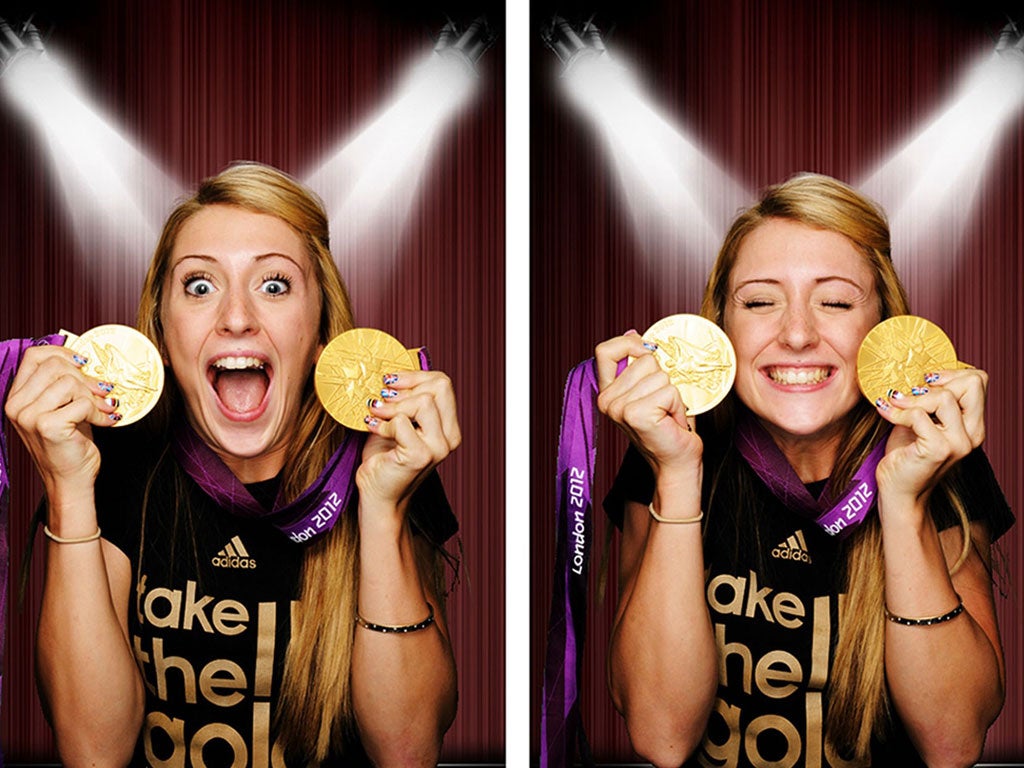Joanna Moorhead: It's not your looks that count, it's giving your heart and soul
The Olympics have given our celebrity-obsessed teenagers a glimpse into another world, where talent, hard work and dedication pay off

In some ways, the past fortnight in my house has been like every other fortnight. Teenagers everywhere, spilling off the sofa. Telly blaring out, eyes glued to it. On the screen, a procession of gorgeous-looking young people a few years older than them: young people whose single ambition is to secure success and fame and to hit gold.
But usually, what my kids and their friends are watching is that God-forsaken The Only Way Is Essex or its urban cousin Made in Chelsea. Or they're lapping up other brainless mush like Jersey Shore or – the worst, in many ways – Big Brother. If I linger by the set on my way through the sitting room, I'm treated to yet another talentless youngster whinging about nothing, while my open-mouthed kids hang on their every word.
But for 14 glorious days it's been different. Since the first Olympic dawn, normal service has been interrupted. Instead of the mindless celebrity drivel, they've been watching the greatest show on earth. Athletes not much older than them have paraded, one after another, displaying what must have come as a bit of a shock to them: real live talent, on TV.
So, let's just unpick that: you mean you don't just get your hair done and your nails painted and your legs waxed and your coolest outfit on to go on the telly... you actually (gasp) have to have some talent to take you there? You mean that rather than being obsessed with how you look when the camera is pointing your way, you might be concentrating on your skill?, even thought that can might make you look a bit sweaty, a bit ruffled, a bit red-faced, a bit (in teen-speak) "weird"? That's definitely not what they'd do on Made in Chelsea.
For me, the very best single thing about the Olympics is that my teenagers saw all this: because I hope against hope that some inkling of these realities has lodged itself into their Towie-tuned brains, and that they might now start to question our almost-celebrity-soaked culture. I hope they'll muse, in some quiet moment next week when they're lounging back in front of Big Brother, that people like Jessica Ennis, Greg Rutherford, Andy Murray and Laura Trott have that little bit extra over the "stars" in the house: not only do they have a talent, but (even more importantly) they've had to combine it with a huge amount of hard work to create something that brought them the glittering, and so real and deserved, moment of fame.
My kids might even reflect on what real fame is: because who in Britain this weekend hasn't heard of Jessica and Greg, Andy and Laura? Real fame stretches into the furthest corners, embraces the widest social mix, touches all of us, whatever age we are and wherever we live and whatever we do the rest of the time. Real fame isn't the nonsense that TV companies serve up for teenage ghettos, conspiring with other commercial interests to promise an unattainable futurer. Odd that they call it "reality TV".
But the Olympics, on the other hand, was the genuine article. Every single member of Team GB had only got there because of real grit, real sweat, and real tears. Their stories are of fortitude – like that of the cycling pursuit rider Jo Rowsell who has suffered from alopecia since her teens; or the judo competitor Gemma Gibbons, who, as she finished her match, mouthed "I love you Mum" up to the mother who died of leukaemia. And then there was the taekwondo hopeful Sarah Stevenson, who lost both her parents and suffered a major knee injury over the past 12 months. She, sadly, didn't win a medal: but as the whole world knows, many in Team GB did.
And when we listened to them being interviewed afterwards we discovered they were incredibly, amazingly, down-to-earth. Not a trace of affectation in a single one: just a constant stream of lovely, grounded, humble, caring young people who had worked harder than they'd known they could work, and who wanted to acknowledge that they couldn't have done it on their own, and even that we – the crowds in the stadium, the viewers at home – had done their bit as well. Night after night, they played down their own input and played up other people's – which may not be what today's teenagers expect of what they have previously perceived as greatness. Take this from Laura Trott, 20, the new star of British cycling: "I'm not really the brightest spark out there. I just ride as hard as I can and as long as I can."
My hope, and surely this weekend it's the hope of every other British parent who's ever worried about the effects on teenagers of our celebrity-obsessed culture, is that our Olympic stars have given our children new, and real, and genuinely inspiring role models. Because yes, it matters that the next generation does sport, and yes, it matters that schools have playing fields; but, most of all, it matters that today's teenagers realise that the Olympians we've seen have learnt lessons that reach way beyond the racetrack, the pool and the equestrian arena. They're lessons about following our passions, about never giving up, about valuing the input of others and about never, ever, underestimating the importance of hard work. If Team GB has given our teens at least a glimpse of these truths, the Olympics really was worth its weight in gold.

Join our commenting forum
Join thought-provoking conversations, follow other Independent readers and see their replies